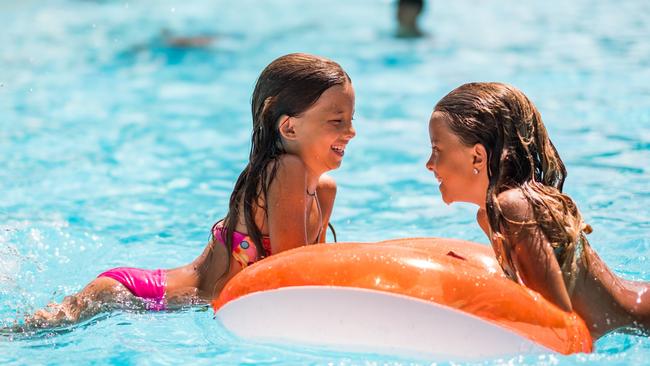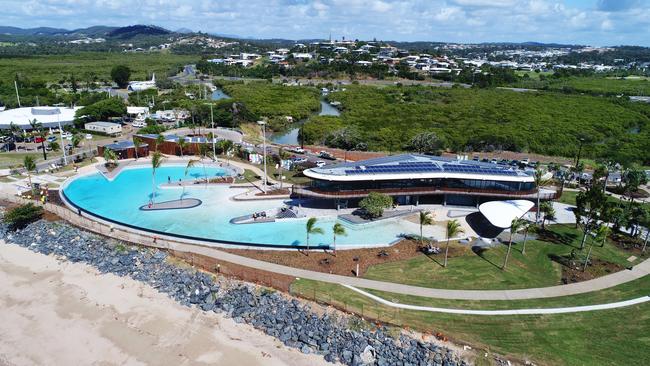Spike in Cryptosporidiosis cases across whole of Queensland
A health alert has been issued after more than 800 cases – the majority in children – were detected across the state and five key regional hotspots identified.

Rockhampton
Don't miss out on the headlines from Rockhampton. Followed categories will be added to My News.
A popular Central Queensland swimming attraction has been forced to close temporarily after “extremely low levels” of cryptosporidiosis were contained in the water.
On Thursday Livingstone Shire Council announced the temporary closure of the Yeppoon Lagoon after precautionary testing of the water identified “extremely low levels” of cryptosporidiosis.
In the announcement, which was posted on Facebook, council said they had been notified by Queensland Health a person with crypto attended the lagoon during the week which spark the precautionary testing.
“Council has water treatment measures in place at all times to protect pool users from germs and debris,” the announcement said.
“However, crypto germs often survive normal levels of pool chlorine. To protect our pool users, we’ve taken the proactive approach to temporarily close the lagoon to treat the pools with extra chlorine.”
It comes after Queenslanders were urged to not use swimming pools, water parks and public recreational water facilities after experiencing diarrhoea after cryptosporidiosis cases spiked across the state.
Crypto is an intestinal infection caused by the microscopic parasite Cryptosporidium and is spread by consuming food or swallowing water that has been contaminated with the crypto germs.
From the beginning of 2024 up to February 7, more than 823 crypto cases have been recorded in the state.
Of this, 736 cases were reported in January, 13 times higher than January 2023 and more than the 2022 annual total of 568 and 2021 annual total of 569.

The majority of cases have been recorded in metropolitan areas and West Moreton, Darling Downs, Central Queensland, Townsville and Mackay Hospital and Health Service regions.
Children are affected the most by crypto with children under nine accounting for 39 per cent.
Chief health officer Dr John Gerrard warned the parasite was usually acquired through the ingestion of contaminated water or food or contact with infected individuals or animals.
The illness can also be picked up particularly in swimming pools, water parks and other recreational water facilities where “water may be contaminated with faecal matter”.
Children aged nine or younger accounted for a whopping two out of every five cryptosporidiosis cases in January 2024, while a quarter of cases were in those aged 30 to 39.
“The most common symptom of cryptosporidiosis is diarrhoea, especially in young children. Other symptoms include nausea, vomiting, fever, headache, and loss of appetite,” Dr Gerrard said.
“People with cryptosporidiosis can remain infectious for a short time after symptoms have ended.
“To prevent spreading the infection, people with cryptosporidiosis should avoid swimming in pools, water parks or other recreational water facilities for at least 14 days after diarrhoea has ceased.”
Mater Hospital infectious disease expert Dr Paul Griffin said there was likely no one simple answer to the spike in cryptosporidiosis case, but noted environmental factors like heat and intense rainfall as well as people getting out more could be involved.
Queensland Health noted the rise in cases was not unique to Queensland, with New South Wales and Victoria also reporting similar increases in cryptosporidiosis notifications in recent weeks.
“Notifications in January 2024 are elevated across Queensland, with the majority of cases recorded in metropolitan areas. West Moreton, Darling Downs, Central Queensland, Townsville, and Mackay Hospital and Health Service regions also recorded an increase in case numbers,” a spokesman said.
“When a reported case is known to have visited a public location while infectious, for example a swimming pool or other public aquatic facility, Queensland Health notifies the facility and works with them to minimise the risk of further transmission.”
The Central Queensland Public Health Unit, which encompasses Rockhampton, Gladstone, Emerald and the smaller hospitals in the region, has had 36 reported cases in January 2024, compared to five for the same period the year before.
Crypto is a common cause of acute diarrhoea in young children and can infect humans along with cattle, sheep, dogs and cats.
The most common symptoms for crypto are diarrhoea and abdominal cramping, but you can experience nausea, vomiting and headaches.
“When you have an upset stomach and diarrhoea there are thousands of germs in your poo and traces on your bottom,” Director of Public Health Dr Gulam Khandaker said.
“These germs wash off and contaminate the water when you go swimming.
“This can occur in pools, water playgrounds, hot tubs, lakes, rivers, springs, ponds, streams, and the ocean.
“If you have been diagnosed with crypto, don’t go back in the water until two weeks after diarrhoea has completely stopped.
“We can all play our part in reducing the spread of crypto by maintaining good hygiene and not swimming while sick.”
To prevent the spread of the infection, anyone who has experienced diarrhoea should avoid swimming in pools, water parks and other recreational water facilities for at least 14 days after the diarrhoea has ceased.
How to prevent it:
- Hand hygiene
- Washing fruit and vegetables before eating
- Not eating or drinking unpasteurised milk products
- Not drinking untreated water and inadequately filtered water (boil untreated water or unknown quality for at least one minute)
- Avoiding swallowing water from swimming pools and other recreational waters.
People who have had cryptosporidium can protect others by doing the following:
- Not preparing food for others until at least 48 hours after diarrhoea has ceased
- Staying away from childcares and not providing personal care to others until at least 24 hours after diarrhoea has ceased
- Staying away from swimming pools until 14 days after symptoms have ceased.




